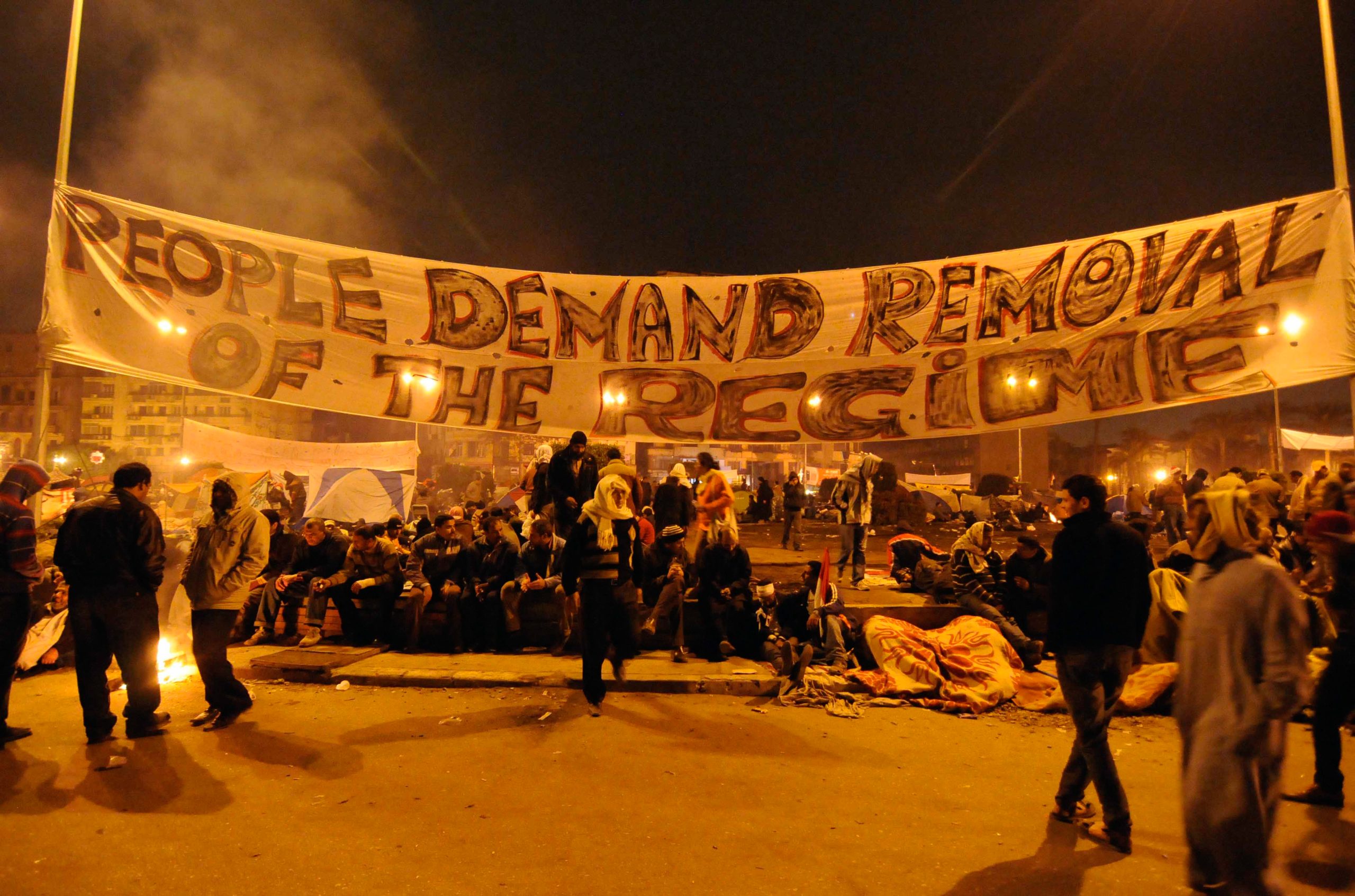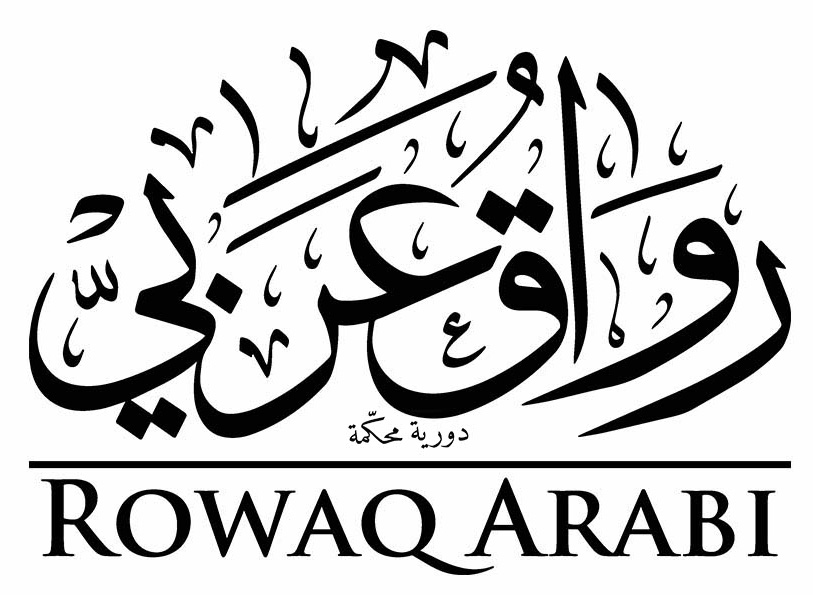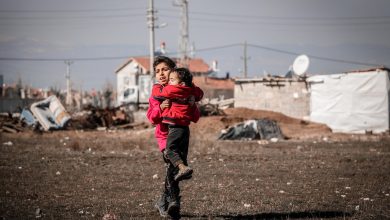Views: Democratisation and Human Rights in the Arab World, Enduring or Temporary Impasse?

Citation: Hassan, Bahey eldin (2024) ‘Democratisation and Human Rights in the Arab World, Enduring or Temporary Impasse?’, Rowaq Arabi 28 (3), pp. 23-35, DOI: 10.53833/SAHE4870.
The world is currently witnessing a steady retreat from democracy and respect for human rights, as evidenced by the gradually dwindling number of countries categorised as free or semi-free and the burgeoning number of authoritarian regimes, which in 2022 ruled over some seventy-two per cent of the world’s population.[1] In addition, the Arab world is proving enduringly intractable to democratisation. Arab countries joined none of the three global waves of democratisation of the twentieth century, and the status of human rights continues to deteriorate. Regimes in the region weathered the storm of uprisings and revolutions that swept the region during the Arab Uprisings in the second decade of the current century. Not only was a steep price paid, but some of these regimes became even more authoritarian and brutal.
When the Arab Uprisings came, some analysts hastened to spread the word that the impasse had been temporary, and that the Arab world had ceased to be an exception to history and geography. But when the uprisings came crashing down, others said it had closed the debate over the potential for any subsequent democratic transition.
The Particularity of Democracy and Human Rights in the Arab World
Arab and international human rights organisations issue frequent, documented reports of human rights abuses and crimes in the Arab world, detailing nearly every type of gross violation of human rights known under international law. But this will get us no closer to understanding the particularity of the problem. Among these violations are some of the most heinous crimes prohibited in armed combat between countries at war, though Arab armies and security services committed these crimes, prohibited in war, against their own people. Worse, the heads of state who committed them more than once,[2] at the end of the last century and the beginning of this one, were not held accountable. In fact, they are still viewed as national heroes by broad sectors in the Arab world, including leaders of opposition political parties, rights advocates, and trade union leaders,[3] who routinely do not hesitate to teach lessons to the peoples of the region, their rulers, and the international community about democracy, human rights, the right of peoples to self-determination, and the need to abandon double standards.
It is therefore not surprising that many Arab and non-Arab analysts and experts consider the Arab region an exception[4] when it comes to the prospects for democratisation and respect for human rights, particularly since there has been no cohesive democratic vanguard pursuing this mission for several decades. The rules and approaches used to analyse other regions do not apply to this region, and consequently, neither do the universally recognised approaches to advancing democratisation and respect for human rights. Is that correct? What are the roots of this exception?
Culture is the common entry point of those who argue for the exceptional nature of the Arab world and its imperviousness to democracy and human rights. Many of them focus on the religious component—that is, the religion professed by the majority of the citizens in the region. Islam, in their views, ‘is organically different from all other religions. Since the Prophet revealed a religion and founded a state at the same time, his successors are unable to isolate these two elements without betraying his message’.[5] Montesquieu, the French political philosopher who established the separation of powers in the eighteenth century, was categorical in this regard, asserting that ‘a moderate Government [is] most agreeable to the Christian Religion, and a despotic Government to the Mahometan’.[6] Others argue in the same vein that ‘the Arabo-Islamic tradition was not conventionally familiar with the concept of “liberty”, nor did it develop a concept of individualism’.[7] This may present a problem, since ‘where the scriptures are both holy and explicit, as is the case with Islam, pragmatic compromise will be very difficult’.[8] In his most important work, Nazih Ayubi adds, ‘Like all hegemonic ideologies, Sunni Islam has often induced the consent of the governed…the juridic theory of the Sunni ‘ulama’, although not completely deaf to the merchants’ inclinations, was far more “statist” in its orientation than it was mercantile or even “social” in the broader sense’.[9] Moroccan historian Abdallah Laroui believes, as summarised by Ayubi, that the Arab state ‘has never been associated, in its emergence and development, with the idea of liberty (in its Western sense). Liberty (hurriya) in Islamic thought has a psychological/metaphysical meaning, whereas in Western thought it carries mainly a political and social meaning’.[10] For Ayubi, therefore, the Arab state ‘is all body and muscle but with little spirit and mind and with no theory of liberty…this type of state must ultimately be based on usurpation and coercion: forever subject to the threat of a stronger contender and always removed from the domain of moral values (except in the case of “unreal” Islamic utopia)’.[11] Some may infer from Ayubi’s sharp criticism of the Arab state that he concludes that it is a strong state. For him, however, it is a weak state, with all its might manifested against society. H.A.R. Gibb adds another important aspect: ‘no social institutions have been evolved through which the public will can be canalized, interpreted, defined, and mobilized…There is, in short, no functioning organ of social democracy at all’.[12]
In short, these intellectuals and scholars, Arab and non-Arab alike, tell us that the Arab world is stubbornly intractable and impervious to democratisation and respect for human rights. This imperviousness is deeply rooted in holy scripture as well as associated social structures and cultures persisting throughout history. Are we dealing with an abiding predicament, then? One that is in some sense ‘racial’ and therefore untreatable?
Reflecting on the evolution of human societies throughout history may help us understand the horizon of the current impasse of democratisation and respect for human rights in the Arab world. Democracy and universal human rights principles did not come into being with the birth of humankind. Rather, humanity gradually derived them over thousands of years, with painful ups and downs that included bloody religious and non-religious wars with a staggering human toll. It was only in the eighteenth century in Europe that they began to be concretely articulated. They continued to develop for the next two hundred years, until the middle of the twentieth century, but only after enormous human suffering in two world wars and the dropping of atomic bombs on two cities at the end of the Second World War for the first time in history, just three years before the first universal declaration of human rights was proclaimed.
The Arab world is stuck in an extended moment in its political and social development in which, for specific reasons, it lags behind other regions of the world, especially the so-called Global North, particularly in the development of political systems and respect for human rights.
Over the course of human evolution around the world, human interpretations of sacred religious texts have been subject to continuous change and reconsideration depending on changing times and places. Islam is no exception. Indeed, the fatwas given to Muslims in Egypt by Imam Shafi‘i, the imam of one of the four major schools of Sunni Islam, were different from those he issued to Muslims in Iraq before his departure. Kuwaiti academic Khaldoun Hassan al-Naqib cautions, ‘There is no such thing as an abstract culture stripped of history and the hardship of human experience and human purposes. If Arab-Islamic civilisation is indeed a jurisprudential civilisation, as Moroccan academic Mohammed Abed al-Jabri says, the entire cultural production in the Levant since the beginning of the [twentieth] century, and in particular, since the end of the First World War, is nothing but attempts to break free of the fetters of jurisprudence and limit it to matters of religion’.[13] Traditionally, the search for liberation from the constraints of jurisprudence moves directly towards the secularisation of the state, yet it is interesting to contemplate the trajectory of this liberation in the historical development of Islamic societies, as it gives us insights on the present and the future of cultural, social, and political development. According to Ahmet Kuru, the structure of the relationship between religious scholars and the ruling elite has had a critical influence on the historical development of Muslim societies. The separation between them is in fact a fundamental factor in the flourishing of the Islamic state in its golden age between the eighth and eleventh centuries CE. On the other hand, Kuru notes that their alliance ‘has marginalized the intellectuals and merchants’ and ‘should be held responsible for the scientific and socioeconomic stagnation, as well as the authoritarianism, witnessed in most Muslim-majority countries today’ and since the twelfth century CE.[14]
Moroccan historian Ali Umlil believes that ‘Islamic culture contains elements that may be both congenial and uncongenial to democracy, depending on the particular society and on the historical conjuncture’.[15] On the other hand, Sudanese academic Abdullah al-Naim, in his conclusions for a symposium on the cultural dimensions of human rights, insists on the crucial importance of political, rather than religious factors, especially the political authority of the Arab state, in the preponderance given to one or more schools of Islamic scriptural interpretation over others.[16] Egyptian historian Khaled Fahmy, in his study of the development of law and justice in Egypt in the nineteenth century, also emphasises the vital role of siyasa, the temporal legal system operative in much of the premodern Islamic world in what he calls the ‘secularization’ of Sharia (Islamic law), noting, ‘the shari‘a that was implemented in the nineteenth-century Egyptian legal system in the nineteenth century derived its flexibility and adaptability from coupling fiqh [Islamic jurisprudence] with siyasa. This was mainly done by founding siyasa councils alongside qadi courts…’. He later asserts, ‘Shari‘a became secularized in khedival Egypt not because it was limited to the realm of personal status alone, but because its partner in crime, the siyasa councils, were successful in embracing the bureaucratic and medical techniques of the modernizing, centralizing state’.[17]
Obstacles hindering respect for human rights in the Arab world are not found in one or more religious texts, but in the nature of the relations of political power and their impact on the religious sphere. Larry Diamond draws attention to a survey which found that when comparing Muslims to Christians in nine developing countries, ‘On social issues, Muslims seemed to be less liberal and tolerant. On questions of democratic culture, such as political tolerance, participation, support for free speech, and disapproval of nondemocratic alternatives, Muslims usually do not differ significantly from non-Muslims’. Hence, he concludes, it is impossible ‘to say that the Islamic culture is either less or more supportive of a democratic system of government’ than Christian or other cultures.[18] In the same context, Diamond notes the findings of Pippa Norris and Ronald Inglehart in their survey of Islamic culture and democracy: ‘Support for democracy is surprisingly widespread among Islamic publics, even among those that live in authoritarian societies’.[19] Many observers mistakenly chalk up some authors’ tendency to explain human social development through the lens of religion to these authors’ religious biases. In fact, it is their theoretical conceptions of the political culture of peoples and societies, both Islamic and non-Islamic, that are in error.
Palestinian academic Azmi Bishara argues that the idea that there is ‘an immutable essence of peoples’ cultures is a non-historical approach’. ‘The notion that a democratic culture could be prior to a democratic system is belied by history’, he writes, explaining that ‘the so-called dominant democratic culture, which fosters commitment to the rule of law, citizens’ rights, and political pluralism, is the product of a gradual evolution of the democratic system’.[20] As for the birth of the democratic system itself, according to Barrington Moore Jr., it ‘was not associated with any particular essential cultural core, religious or otherwise, but was rather related to the development of social structure and associated political conflicts.’.[21]
The historical development of democracy and its values in the United States offers a perhaps surprising response to those who favour religious and culturalist explanations. In another study, Bishara again turns to the work of Barrington Moore, explaining: ‘The [American] civil war, which was driven by a question of grave moral and cultural import—namely, slavery—took place between white Christians of European origin who had adopted different economic systems. Despite their common religion and origin, two distinct political cultures emerged as a result of differing historical and economic conditions. Change was imposed politically on the South and then its culture gradually changed’.[22] However, the distinction in political culture between the American North and South persists even today.
If Moore asserted that ‘the culturalist explanation ultimately rests on a circular argument’,[23] Egyptian academic and rights defender Mohamed El-Sayed Said thought it led to a ‘fallacy of historicity, for modern democratic culture cannot be derived from pre-modern historical traditions. Nor can it be opposed by contrary traditions from ancient or medieval history’.[24] Said puts what he called ‘cultural determinism’ in the same basket with ‘its traditional companions, especially geographical determinism…such as theories of eastern despotism, political Pharaonism, the riverine society, the tribal sacralisation of violence, and theories of traditional society, national character, and religious culture as a source of violence etc.’.[25]
It is authoritarian regimes that most benefit from explanations that locate the cause of delayed democratisation and the deterioration of human rights in the culture of peoples, even in countries that fall at the bottom of the global ranking for respect for human rights, such as Egypt. In its National Strategy for Human Rights, the Egyptian government attributes the unprecedented deterioration of human rights in Egypt to the undeveloped consciousness of citizens, political parties, and civil society. The chief mission of the pledged strategy is thus for the government to educate these parties on human rights.[26] It should be noted that Egypt ranks 140th out of 142 countries in respect for fundamental rights, while it comes in dead last on the indicator of open government.[27]
Breakthroughs in the Wall of the Arab Exception
Culturalist explanations that confidently dismiss the possibility of democratisation in the Arab world do not explain why several Arab countries trod democratic pathways from the mid-nineteenth to the mid-twentieth century, realising early on the close linkage between the requirements for liberation from colonialism and weapons of democratic struggle, such as freedom of the press, student unions, trade unions, political parties, an elected parliament, and a constitution that embodies these principles and protects these platforms. It is also noteworthy that (Islamic) clerics played a distinct historical, intellectual, and political role in this context, especially in Egypt,[28] among them Sheikh Rifa‘a Rafi‘ al-Tahtawi, Azharite imam Sheikh Muhammad Abdu, and others. As Bishara says, ‘Sudan has lived six of the most important democratic parliamentary experiences in modern Arab history and in the history of the Third World from 1953 to 1958, three of them under foreign rule and three after independence’.[29] Nevertheless, this linkage between national liberation and democracy was the most evident victim of the national independence regimes that have ruled in the Arab world since the mid-twentieth century.
As the political and economic crises of these regimes mounted, especially after the historic military defeat to Israel in 1967, the Arab world began to see a measure of political openness, prompting John Waterbury to observe, ‘There are exceptions to the exceptionalism. Turkey, Lebanon, the Sudan, Egypt, Jordan and the Yemen have periodically or cautiously undertaken democratic experiments’.[30] Said called these attempts regime-initiated ‘liberalisation’, which obviously cannot be attributed to some sudden development in the political culture of peoples. This may explain Said’s reluctance to interpret these reforms as ‘a response to popular pressure’; rather, he saw them as ‘a tactic aimed at stopping an all-encompassing crisis of instability and disintegration in a political system that was already suffering from diminished capacities and absorptive energies in the moral and economic fields’. In his view, this explanation applied to several Arab states: Egypt in 1975–1976, Algeria in 1988–1989, Jordan in 1988–1989, Yemen in 1991–1993, and Morocco in 1991–1993.[31]
The entrenchment of authoritarian regimes in the Arab world after national independence, and even after some of them opened up politically, raises questions that take us back to the original question: If the Arab world is not straining under an enduring exception to democratisation and the impasse is only temporary, why did periods of political openness not persist and why did ‘liberalisation’ not continue to evolve? Said’s response is that liberalisation was merely ‘a package of internal political reforms that are incompatible with the concept of democracy. At best, they constitute a liberal opening or political thaw’. Said called it ‘liberalisation without democratisation’.[32]
With this, did Said already answer a question frequently asked twenty years after he wrote his paper: Why did the Arab Uprisings falter? I think his answer is a starting point for understanding the trajectory in Egypt, especially after President Hosni Mubarak stepped down on 11 February 2011 and the army took the reins.
A number of Arab countries experienced political opening in the first and second waves of the Arab Spring, but it did not translate into a democratic system, with the possible exception of Tunisia before the army-backed constitutional coup on 25 July 2021. This ‘liberal thaw’ is what Egypt began to experience on 11 February 2011 until the military coup on 3 July 2013. The same is true in Yemen in the period after the ouster of President Ali Abdullah Saleh and before the Iranian-backed Houthi armed power grab, followed the Saudi-Emirati military intervention. It happened in Algeria during the years of the Hirak until the parliamentary elections, and in Sudan as well after the uprising and until the military coup on 25 October 2021. In this way, Arab authoritarian regimes weathered the Arab Uprisings with minimal losses; in some cases, like Egypt, they even became more authoritarian and brutal. Meanwhile, Arab peoples sustained millions of casualties in civil wars, armed conflicts, waves of forced asylum, irregular migration, internal displacement, and bloody domestic crackdowns, whether this involved the use of chemical weapons (Syria), organised mass slaughter (Egypt and Sudan), or targeted assassinations (Yemen, Iraq, Lebanon, and Libya).
At times, comparisons based on unsound methodological foundations lead to erroneous conclusions. Francis Fukuyama takes up one of these. Although he notes that there are ‘many obvious differences between the Middle East and regions like Eastern Europe and Latin America, beginning with culture and the impact of Islam’, he does not start from religion and culture to explain progress or delayed democratisation. Rather, he pauses at social development, concluding that ‘the Third Wave transitions in Eastern Europe and Latin America are thus misleading precedents for the Arab Spring’. In order to draw useful lessons, Fukuyama urges comparing the Arab Uprisings to the revolutions of Europe in 1848, in which ‘the middle classes were the key actor’, and where ‘the social basis for a stable democracy did not exist…and it may not yet exist in many parts of the Middle East today’.[33]
In the same context, many analyses, Arab and non-Arab alike, tend to explain the failure of the Arab Uprisings by overestimating the influence of factors such as the weak capacities and organisational structures of popular movements; the lack of trust between secular and Islamist political movements and its impact on the readiness to coordinate and engage in joint action coupled with both parties’ illusions about Arab military establishments; and regional military, political, and financial interventions (the Saudi/UAE axis, Iran, and Turkey), in addition to weak international support.
With the exception of Bahrain (where the months-long uprising of 2011 was suppressed by decisive Saudi and Emirati military intervention) and Syria (where the regime of Bashar al-Assad was saved by intensive Russian and Iranian military intervention, supported by Lebanese Hezbollah militias and Iraqi Shiite parties), it is internal factors that played the decisive role in the failure of the Arab Uprisings, most importantly, the nature of authoritarian regimes in the Arab world. This is also the key entry point for explaining the particularity of the Arab exception to democratisation, before and after the Arab Spring.
The Exceptional Particularity of the Arab Authoritarian Order
The peculiarity and strength of Arab authoritarian regimes lies in their unilateral hegemony over the economy coupled with their ability to weave a broad network of alliances that combines traditional social forces (clan-, family-, and religious-based) with secular modernist parties of the middle class. Nevertheless, their long-term resilience in the face of seismic political and regional crises would not have been possible without their unique ability to spin and market a false, multifaceted ideological discourse, both religious and secular, capable of enlisting rival segments of their opposition— at times, even rights defenders—to join their daily conflicts with international, regional, or local parties, in a way that bolsters their hegemony, weakens domestic opponents, and protects them against succumbing to local, regional, or international pressures, while convincing major international powers that there is no alternative to their regimes if these powers wish to maintain regional stability and safeguard their interests. After the Arab Uprisings, new capacities were added to their repertoire, as regimes touted their ability to rein in Palestinian and/or Arab anger over the brutality of the Israeli occupation and curb irregular migration across the Mediterranean to Europe.
In this context, the economic factor is a crucial pillar of Arab authoritarian regimes’ power. Bishara writes, ‘The rentier economy forms the foundation of the economic authoritarian state in the Arab world (in traditional authoritarian regimes and authoritarian republican regimes)…This gives the state ample room for manoeuvre in its relations with society’.[34] Hazem El-Beblawi emphasises the correlation between the monopolisation of the economy and political authoritarianism, explaining that ‘in the rentier state, the government is the principal recipient of the external rent in the economy’, which allows those few who control rents to monopolise political power as well.[35] According to Bishara, the sources of these rents are not limited to the export of oil and gas, but include as well remittances from Arab expatriate workers, foreign aid, and even the financial support provided by Gulf countries to some Arab states after the collapse of the Arab national project. They also include tourism revenues and geographically-based financial returns such as Suez Canal transit fees. Said notes that the impact of rentier income ‘can also be seen, albeit to varying degrees, in a number of Arab countries that have enjoyed relatively large indirect inflows from these income sources, such as Egypt, Jordan, Syria, Yemen, Algeria, and to a lesser extent Tunisia, Sudan, and others’.[36] This enabled the governments of these countries to barter away some basic citizenship rights.
What are the political implications of the rentier economy? ‘The citizen does not deal in the language of rights, not because they are not available, but because he has privileges instead of rights’, says Bishara.[37] Of course, this conclusion is most applicable to oil-exporting Arab states, but also, to a lesser extent, to the majority of other Arab countries until the end of the 1980s. After that, aspirations for a new social contract emerged,[38] and political protest began to escalate in several Arab countries during the first decade of the new millennium, up until the Arab Uprisings at the beginning of the second decade.
The authoritarian system of government in the Arab world has special features that have played a vital role in the creation and consolidation of the Arab exception. Bishara and Said summarise the three most significant features: firstly, power itself is the main gateway to wealth and status; secondly, there is a broad parasitic social margin around the authoritarian regime, which also runs vertically, in the sense that it includes elements from all social classes who live on state jobs and grants without contributing to social production and whose fate is therefore bound to the authoritarian regime; and thirdly, the bureaucratic authoritarian structure of government is allied with other patriarchal structures: clan-based, tribal, and sectarian.[39]
Said believes that the violent authoritarian form of the state can be explained by ‘property relationships, specifically in the overinflated size of the public sector and the state’s tendency to control all economic indicators and relations’.[40] Iraqi academic Faleh Abdul Jabbar gives us a concrete example of how democracy was made impossible in his homeland after ‘the Iraqi state became the single largest employer in society (absorbing 21% of the workforce), with the social and political dimensions this entails. In particular, the state became the sole arena for social mobility for broad constituencies’.[41]
A comparison with iterations of authoritarianism in other regions may help us to understand the specificity of Arab authoritarianism and the nature of the Arab exception. Academics and political activists, especially leftists, in the Arab world are fond of comparisons with Latin America. The two regions are politically both in the Global South; they were subjected to European colonisation and later US military intervention; and countries in the two regions gained independence at different times, after which authoritarian regimes took power in the majority of countries in both regions, and thus both lagged behind the first and second global waves of democratisation. This similarity does not imply symmetry, nor the same interpretation of these stages of historical development, though some features may appear identical. The similarities between the two regions thus do not explain why one of them (Latin America) joined the third wave of democracy and the other did not. Again, the answer can only be gleaned through a concrete analysis and comparison of their social, economic, and political development—not based on the divergence of religion/s, beliefs, and cultures prevailing in the two regions.
If we turn to the economy, we will find important similarities there as well, but Said cautions against superficial comparisons between populist/developmental experiences in the Arab world and Latin America simply because modern industrialisation in both regions was grounded in the public sector. In Latin America:
The public sector did not extend its dominance over all branches and areas of the economy. Reformist/populist regimes did not try to destroy the class of large agricultural owners and their peers in industry, services, and foreign trade, which necessitated the maintenance of political pluralism, even nominally. The middle class also enjoyed considerable property freedoms, which divided it into radical and liberal wings, strengthening political pluralism. In contrast, Arab developmental populist experiences were characterised by the complete state dominance of economic activity. The establishment of that economic hegemony was coupled with the destruction of the old ruling classes and the tendency of key segments of the middle class to support economic monism.[42] All this led to the emergence of a single political structure, both in legal and practical terms. At the same time, reformism/populism was not imposed from above in Latin American as it was in the Arab world; rather, it emerged and developed as a historical product of successive waves of political and trade union struggles over decades of modern political history.[43]
For all these reasons, Said asserts that authoritarianism in Latin America, and also in equatorial Africa, ‘appears to be a superficial phenomenon’ compared to ‘the depth and breadth of Arab authoritarianism’s penetration in the Arab political and cultural space’.[44]
The core of the region’s prolonged imperviousness to democratisation and the enforcement of universal human rights standards is to be found here, in the exceptional nature of authoritarian government in the Arab world. Consider, too, that this authoritarianism has persisted for more than half a century, during which time it has been able to crush, or wholly marginalise, political parties and vital cells of an independent civil society. ‘This inevitably entailed the certain death of politics in Arab political cultural configuration for a prolonged period’, Said says.[45]
This distressing reality raises multiple vital questions about the prospect of dislodging the pillars of Arab exceptionalism. In particular, it raises questions about the role of political movements, civil society, and the human rights movement in the context of this historical mission. Continuing to operate with the same concepts, strategies, and methods will not lead to different results. What is certain is that simply betting on changing times and new generations to move the region forward will not happen as long as all parties continue to play the same roles and operate by the same concepts. Exploring the prospects for the development of these roles is what I hope to contribute to in a later article.
This article is originally written in Arabic for Rowaq Arabi.
[2] Late Iraqi President Saddam Hussein and current Syrian President Bashar al-Assad.
[3] Cairo Institute for Human Rights Studies (2022) ‘CIHRS 26th Regional Forum: The Responsibility of the Human Rights Movement in the Arab Region Amid a Shifting International Context’, 27 September, https://cihrs.org/cihrs-26th-regional-forum-the-responsibility-of-the-human-rights-movement-in-the-arab-region-amid-a-shifting-international-context/?lang=en; Cairo Institute for Human Rights Studies (2018) ‘Conclusions of the 21st Regional Forum of the Human Rights Movement’, 19 March, https://cihrs.org/conclusions-of-the-third-regional-forum/?lang=en; Fishere, Ezzedine (2023) ‘Views: Who’s Really Committed to Human Rights? Ideological and Political Impediment in the Arab Region’, Rowaq Arabi 28 (2), pp. 46–54, https://doi.org/10.53833/FNSN2611; Ziadeh, Radwan (2018) ‘Double Standards, the Stances of Arab Human Rights Organizations on the Humanitarian Catastrophe in Syria’, Rowaq Arabi 23 (1), pp. 11–18, https://doi.org/10.53833/UTUV3569.
[4] See Ghassan Salamé’s introduction to the first and second printing of his book: Salamé, Ghassan (2011) Nahw ‘Aqd ‘Arabi Jadid [Towards a New Social Contract] (Beirut: Centre for Arab Unity Studies); Leca, Jean (1994) ‘Democratization in the Arab World: Uncertainty, Vulnerability and Legitimacy’, and Waterbury, John (1994) ‘Democracy without Democrats?: The Potential for Political Liberalization in the Middle East’, both in Ghassan Salamé (ed.) Democracy without Democrats?: The Renewal of Politics in the Muslim World (London: I. B. Tauris).
[5] Salamé, Ghassan (1994) ‘Introduction: Where Are the Democrats?’ in Ghassan Salamé (ed.) Democracy without Democrats?: The Renewal of Politics in the Muslim World (London: I. B. Tauris).
[6] As quoted in Abd al-Fattah, Imam (1994) al-Taghiya: Dirasa Falsafiya li-Suwar al-Istibdad al-Siyasi [Despotism: A Philosophical Study of Forms of Political Tyranny] (Kuwait: Alam al-Maarifa, National Council for Culture, Arts, and Literature).
[7] Ayubi, Nazih (2009) Over-stating the Arab State: Politics and Society in the Middle East (London: I. B. Tauris).
[8] Waterbury.
[9] Al-Ayubi.
[10] Ibid.
[11] Ibid.
[12] Gibb, Hamilton A. R. (1959) ‘Social Reform: Factor X’. Cited in Huntington, Samuel (1968) Political Order in Changing Societies (New Haven: Yale University Press).
[13] Hassan al-Naqib, Khaldoun (1996) al-Dawla al-Sultawiya fi al-Mashriq al-‘Arabi al-Mu‘asir [The Authoritarian State in the Contemporary Arab Levant] (Beirut: Centre for Arab Unity Studies).
[14] Kuru, Ahmet (2021) ‘The Ulema-State Alliance: A Barrier to Democracy and Development in the Muslim World’, Tony Blair Institute for Global Change, 2 September. This a summary of Kuru (2021) Islam, Authoritarianism, and Underdevelopment: A Global and Historical Comparison (Cambridge: Cambridge University Press).
[15] Al-Ayubi.
[16] Al-Naim, Abdullah (ed.) (1993) al-Ab‘ad al-Thaqafiya li-Huquq al-Insan fi al-Watan al-‘Arabi [Cultural Dimensions of Human Rights in the Arab World] (Kuwait: Dar Suad al-Sabbah).
[17] Fahmy, Khaled (2018) In Quest of Justice (Oakland: University of California Press).
[18] Diamond, Larry (2008) The Spirit of Democracy: The Struggle to Build Free Societies Throughout the World (New York: Henry Holt). He cites a study by Esmer, Yilmaz (2002) ‘Is There an Islamic Civilization?’ Comparative Sociology 1 (3), pp. 265–298.
[19] Diamond.
[20] Bishara, Azmi (2023) ‘al-Thaqafa al-Siyasiya: Mulahazat ‘Amma’ [Political Culture: General Remarks], Tabayyun 45, https://doi.org/10.31430/QIDT9752.
[21] Ibid., citing Moore, Barrington (1993) Social Origins of Dictatorship and Democracy: Land and Peasants and the Making of the Modern World (Boston: Beacon Press).
[22] Bishara, Azmi (2020) al-Intiqal al-Dimuqrati wa-Ishkaliyatuh: Dirasa Nazariya wa-Tatbiqiya Muqarina [Problems of Democratisation: A Comparative Theoretical and Applied Study] (Doha: Arab Centre for Research and Policy Studies).
[23] Bishara (2023).
[24] Said, Mohamed El-Sayed (1996) ‘Ishkaliyat Ta‘aththur al-Dimuqratiya fi al-‘Alam al-‘Arabi’ [The Question of the Democratic Impasse in the Arab World], in Azmi Bishara and Mohamed El-Sayed Said (eds.) Ishkaliyat Ta‘aththur al-Tahawwul al-Dimuqrati fi al-Watan al-‘Arabi [Questions on the Impasse of Democratisation in the Arab World] (Birzeit: Muwatin Institute for Democracy and Human Rights), https://muwatin.birzeit.edu/en/node/1275.
[25] Ibid.
[26] Cairo Institute for Human Rights Studies (2021) ‘Egypt: National Strategy for Human Rights a Ruse to Show International Community and Donor States that Political Reform Is Underway’, 15 November, https://cihrs.org/egypt-national-strategy-for-human-rights-a-ruse-to-show-international-community-and-donor-states-that-political-reform-is-underway/?lang=en.
[27] World Justice Project (2013) ‘Egypt Ranks 136th out of 142 in Rule of Law Index’, 25 October, https://worldjusticeproject.org/sites/default/files/documents/Egypt_1.pdf.
[28] See, for example, Awad, Louis (2022) Tarikh al-Fikr al-Misri al-Hadith [History of Modern Egyptian Thought] (Cairo: Dar al-Mahrousa), 3 vols; Farag, Nabil (2007) al-Dimuqratiya fi Fikr Ruwwad al-Nahda al-Misriya [Democracy in the Thought of the Pioneers of the Egyptian Renaissance] (Cairo: Cairo Institute for Human Rights Studies).
[29] Bishara (2020).
[30] Waterbury.
[31] Said.
[32] Ibid.
[33] Fukuyama, Francis (2014) Political Order and Political Decay (London: Profile Books); for more on a comparison of the 1848 revolutions in Europe and the Arab Spring, see: Kramer, Steven Philip, and Judith S. Yaphe (2014) ‘The European Spring of 1848 and the Arab Spring of 2011: Lessons to Be Learned?’ Mediterranean Quarterly 25 (4), pp. 45–63, https://www.muse.jhu.edu/article/566693.
[34] Bishara, Azmi (1996) ‘Waqi‘ wa-Fikr al-Mujtama‘ al-Madani’ [The Reality and Thought of Civil Society], in Azmi Bishara and Mohamed El-Sayed Said (eds.) Ishkaliyat Ta‘aththur al-Tahawwul al-Dimuqrati fi al-Watan al-‘Arabi [Questions on the Impasse of Democratisation in the Arab World] (Birzeit: Muwatin Institute for Democracy and Human Rights).
[35] El-Beblawi, Hazem (1987) ‘The Rentier State in the Arab World’, Arab Studies Quarterly 9 (4), pp. 383–398, cited by Bishara (1996).
[36] Said.
[37] Bishara (1996).
[38] See: Salamé (2011).
[39] See the introduction in: Bishara, Azmi, and Mohamed El-Sayed Said (eds.) (1996) Ishkaliyat Ta‘aththur al-Tahawwul al-Dimuqrati fi al-Watan al-‘Arabi [Questions on the Impasse of Democratisation in the Arab World] (Birzeit: Muwatin Institute for Democracy and Human Rights).
[40] Said.
[41] Abdul Jabbar, Faleh (1996) ‘al-Dimuqratiya al-Mustahila wa-l-Dimuqratiya al-Mumkina’ [Impossible Democracy and Possible Democracy], in in Azmi Bishara and Mohamed El-Sayed Said (eds.) Ishkaliyat Ta‘aththur al-Tahawwul al-Dimuqrati fi al-Watan al-‘Arabi [Questions on the Impasse of Democratisation in the Arab World] (Birzeit: Muwatin Institute for Democracy and Human Rights).
[42] I believe Said means by this the state’s monopolistic control of the economy.
[43] Said. Said here seems to be expounding on Fukuyama’s caution about comparing the Arab Spring with Third Wave democratisation in Latin America, though he preceded Fukuyama by some two decades.
[44] Ibid.
[45] Ibid.
Read this post in: العربية





